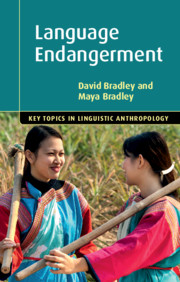Book contents
- Language Endangerment
- Key Topics in Linguistic Anthropology
- Language Endangerment
- Copyright page
- Contents
- Tables
- Acknowledgements
- 1 Introduction
- 2 Stages of Language Endangerment
- 3 Working in a Community
- 4 Identity and Attitudes
- 5 Language Knowledge and Use
- 6 The Sociolinguistic Setting
- 7 Linguistic Processes
- 8 Policy and Planning
- 9 Language Reclamation
- 10 Methodology
- 11 Conclusion
- Glossary of Terms
- References
- Index
- References
3 - Working in a Community
Published online by Cambridge University Press: 11 November 2019
- Language Endangerment
- Key Topics in Linguistic Anthropology
- Language Endangerment
- Copyright page
- Contents
- Tables
- Acknowledgements
- 1 Introduction
- 2 Stages of Language Endangerment
- 3 Working in a Community
- 4 Identity and Attitudes
- 5 Language Knowledge and Use
- 6 The Sociolinguistic Setting
- 7 Linguistic Processes
- 8 Policy and Planning
- 9 Language Reclamation
- 10 Methodology
- 11 Conclusion
- Glossary of Terms
- References
- Index
- References
Summary
Ethical research is not just a moral obligation, inappropriate behaviour is unacceptable. It can have bad consequences for a community and for later researchers; no one welcomes the eleventh nerd. Communities and individuals within them have priorities, and they usually do not include spending time with an outsider whose future intentions and use of the material collected are unknown. They often suspect that researchers wish to benefit financially from what is collected; and in truth nearly all researchers do wish to benefit, at least in terms of advancing their academic discipline and their own career. It is wise to have a truthful and understandable reason why you want to do your research in a particular place which you can explain to people.
- Type
- Chapter
- Information
- Language Endangerment , pp. 38 - 63Publisher: Cambridge University PressPrint publication year: 2019

